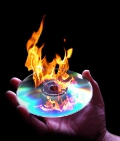
Last night we rented "Walk the Line" from Hollywood Video, brought it home, and popped it into the computer. Lo and behold, it won't play because of a DRM copy protection that thinks my monitor and graphics card don't belong together. All of my hardware is legitimate, I paid money to rent the video, and I don't get to watch it. Next I tried my Playstation 2 as a DVD player. Again, the DVD won't play because of the copy protection. Finally, I tried my laptop. Again, it refused to play. Three perfectly legitimate devices and not one can play "Walk the Line" because of the DRM copy protection. That kind of ruins your night, you know?
Tonight I was reading an article on IGN.com and came across a quote that sums up exactly what I was feeling yesterday:
"Rampant piracy is just unserved customers" - Jason Holtman, Director of Business Development, Valve Software
If I get a legitimate copy of a movie and can't play it on legitimate hardware, doesn't that make the pirated version more valuable than your frisbee? Can't you get it through your thick skulls!? I want to get the movie legitimately! I want to pay money for it! Stop kicking your own butts! Stop ruining your own business!














